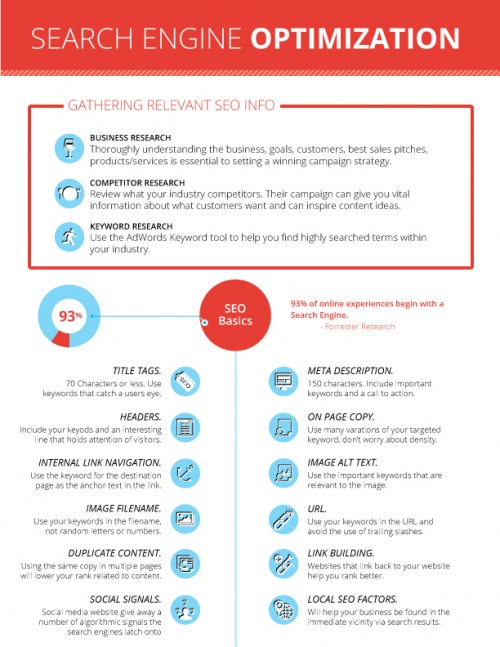Download Search Engine Optimization Secrets PDF here.
Search Engine Optimization is one of the essential elements of a successful marketing campaign for your business. Below are the core elements of a successful SEO campaign:
- Business Research – thoroughly understanding the business, goals, customers, best sales pitches, products/services is essential to setting a campaign strategy.
- Competitor Research – reviewing what your competitors are doing in the space can often tell you vital information about what the customers in the market want and can also help inspire your content ideas.
- Keyword Research – use the AdWords Keyword tool to help you find highly searched terms within your industry.
- On Page Search Engine Optimization – factors on your website
- Tagging – HTML source code optimization is a vital part of SEO. Use your keywords in these tags.
- Title tag – Use 70 characters or less. Include important keywords and think about what will grab searchers attention.
- Meta description – Shoot for 155 characters and include important keywords. Have a good call to action.
- Headers – include your keywords and an interesting line that will hold attention of visitors
- On page copy – use many variations of your targeted keyword, don’t worry about keyword density.
- Internal link navigation – Make sure you use the keyword for the destination page as the anchor text in the link.
- Image alt text – Use the important keywords that are relevant to the image
- Image filename – Use your keywords in the filename, not random letters or numbers.
- URL- Use your keywords in the URL and avoid the use of trailing slashes. Ideally it looks like joelx.com/exampe-keyword.
- Robots.txt – Visit http://moz.com/learn/seo/robotstxt
- User behavior metrics / User experience – search engines monitor user behavior via javascript
- Search Engine Results Page Clickthrough Rates – percentage of people who do a search and then click on a specific URL for that keyword.
- Search Engine Results Page Bounce Rate – percentage of people who click on a search result then quickly hit the back button when they don’t find what they want.
- Search Engine Results page Follow On Searches – people who return to the search engine after visiting your URL, what do they search for?
- Duplicate content – Search engines avoid showing the same content twice in search results
- Copy / paste – if you take your content from another source, generally your page will not rank in search queries related to that content.
- Structural – does your website URL structure inadvertently create duplicate content? If so, it will split your link authority between various pages.
- Tagging – HTML source code optimization is a vital part of SEO. Use your keywords in these tags.
- Off Page Search Engine Optimization – there are a number of factors outside of your website itself which influence how your website will show up in search results.
- Link building – building high quality links from other website to yours will help your site rank better.
- Social signals – social media website give away a number of algorithmic signals the search engines latch onto.
- Google +1 http://www.google.com/+/learnmore/+1/
- Facebook shares – number of people sharing your content in their news feed
- Facebook comments – number of comments that your posts get
- Facebook likes – number of likes that your posts receive
- Pinterest – Use tall vertical images rather than horizontal ones. Use 100 character keyword based descriptions.
- Tweets – the number of people retweeting your links on Twitter helps with performance.
- Instagram – don’t forget to use hashtags.
- Local SEO factors: Local SEO will help your business be found in your immediate vicinity via search results.
- Google Place Page – Keywords in categories, business title, promixity
- External location signals – NAP, IYP, citation volume
- Review signals – number of reviews, review velocity, review diversity
- Google Plus Authority – increase your page strength by associating a power Google Plus profile with it
- Structured Citations – use high quality structural citations from other sites
